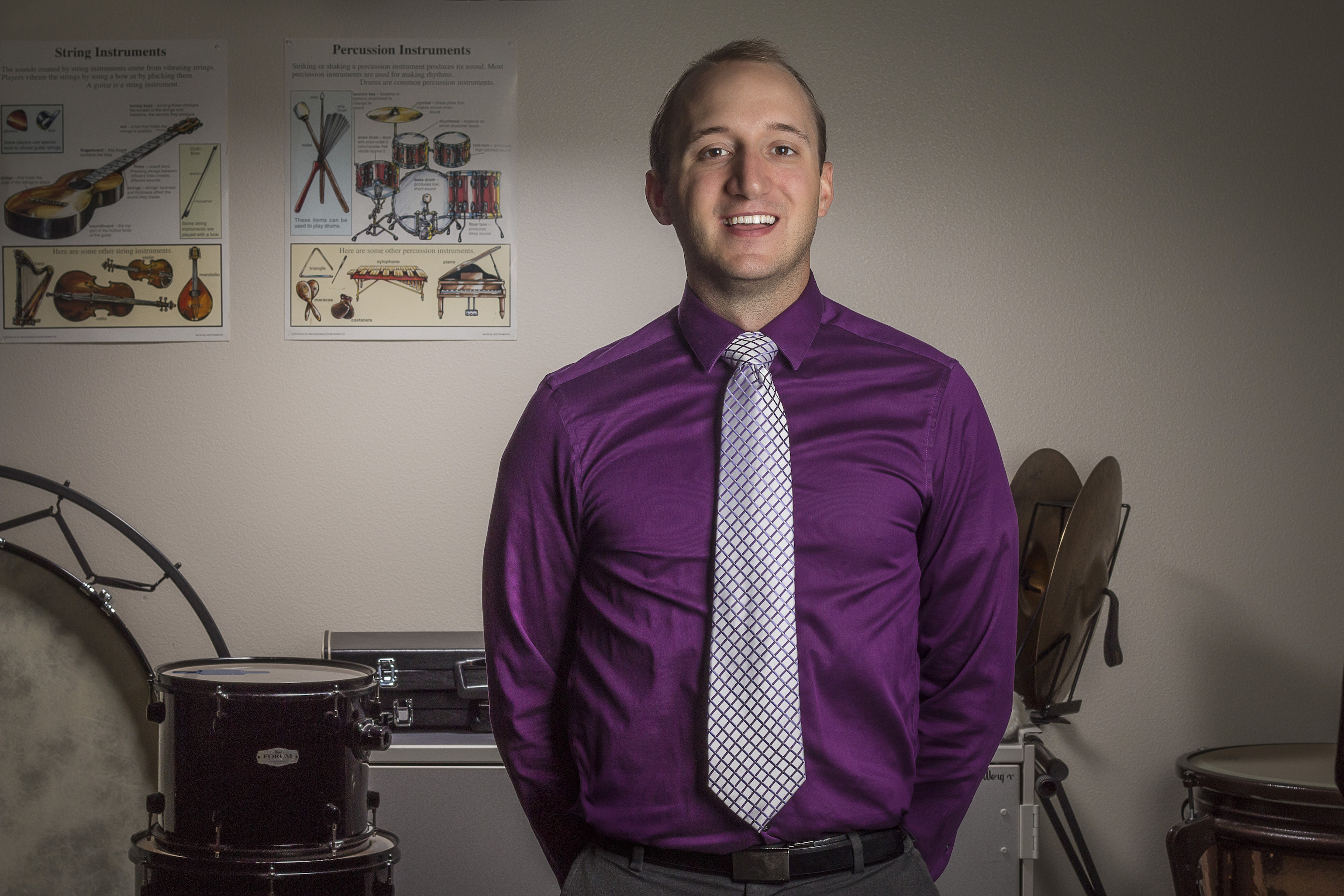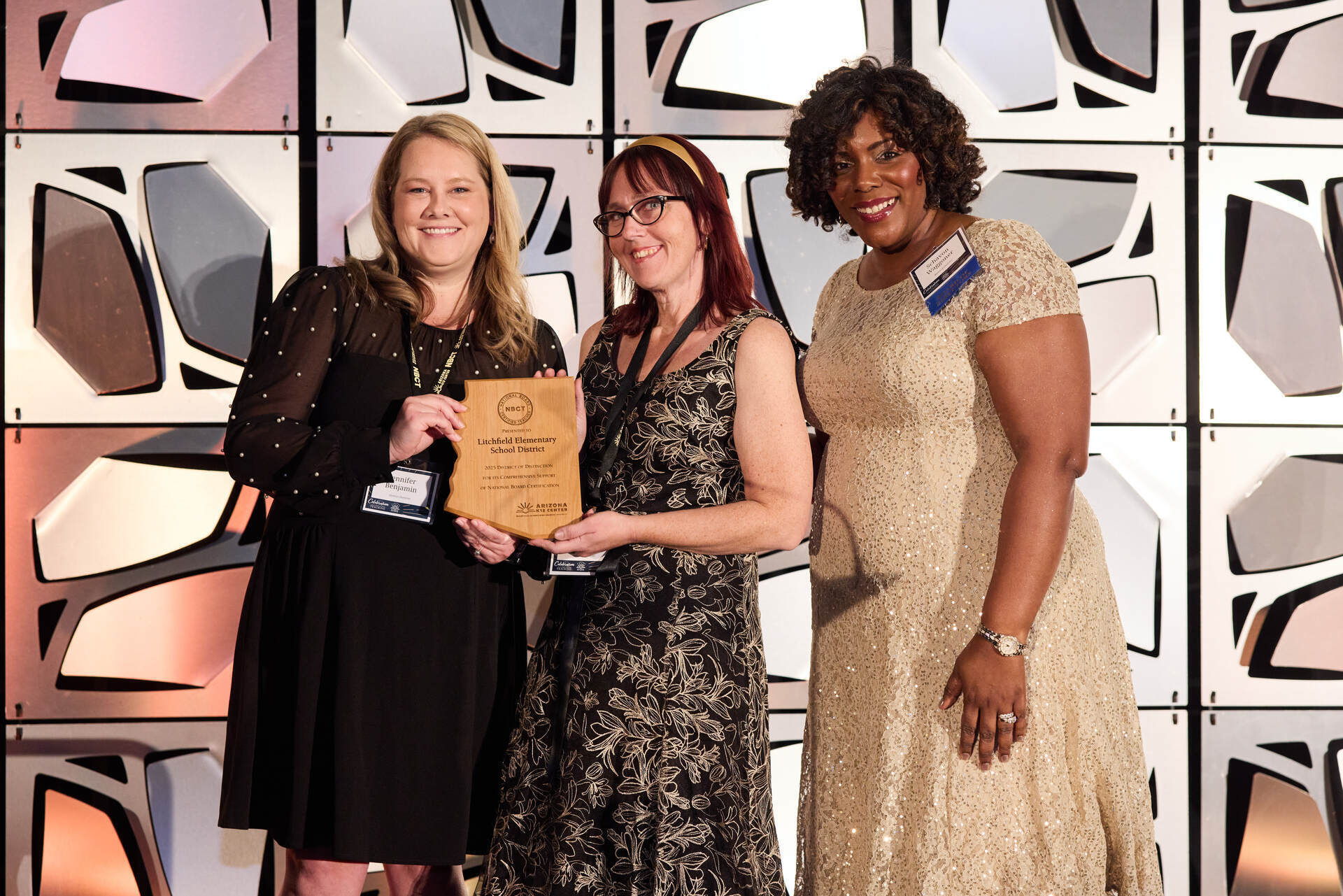December 1, 2017
First Friday: Standing on the Verge
The education community has a lot to get done. Robert Wagner II has some advice — and it’s music to our ears.
Music has always been integral to Roger Wagner II’s life.
Growing up near a small dairy farm in Davison, Michigan, Wagner sang in choir and praise groups from a young age and began playing piano in elementary school. He picked up the tenor saxophone in the fifth-grade beginner band, which met before school. As a high school senior, he auditioned for music education programs in order to follow his passion. “Since then, I haven’t stopped,” he says.
Wagner has been teaching music for six years. He’s currently in his fifth year at Desert Wind Middle School in Maricopa, where he’s taught an expansive variety of courses, including beginning and advanced band, choir, digital music, music history, and orchestra.
When first deciding to teach, Wagner envisioned himself working with elementary students, but his student teaching placement changed his mind, pushing him toward secondary.
“Middle schoolers, in particular, are amazing, awkward, beautiful, morphing adolescent human beings. They can try on personalities like gloves, then move on — or they can commit to something and make it part of their identity.”
Teaching music to six, seventh, and eighth graders has deeply rewarded Wagner in unexpected ways. “Sixth grade is often where students start their music ensemble education, like band, choir, and orchestra,” he says. “I don’t necessarily plant the seeds, but I get to be a part of nurturing the seedlings into healthy, growing plants that will likely flower when they get to high school.” Working with the local high school, Wagner often gets to see those flowers firsthand.
Wagner is so passionate about the future of the arts in Arizona (and across the country) that even his description of his music education community is emphatically lyrical.
“There is a lot of work that needs to get done. We are a community on the verge,” he explains.
On the Verge
On the verge of what, exactly? Wagner explains.
“We’re on the verge of changing how we educate ourselves and future teachers. We’re changing our views on what constitutes musicianship, what music education is — or isn’t, and what ought to be taught in our schools.
“Sometimes, we’re on the verge of booming. Since our programs at Desert Wind Middle School and in Maricopa School District have exhibited tremendous growth, we have significantly expanded our course offerings and staff.
“Sometimes, we’re on the verge of folding. Because of enrollment, orchestra has been closed at my school site for the last three years, but it was reopened this year, due to our boom.
“We’re on the verge of outdated. Sure, we use ‘old’ instruments with music from composers that have been long dead —
“— but we’re also using digital instruments and tools, as well as contemporary music. We’re on the verge of the cutting edge.”
A Day in the life of Wagner
On a typical day, Wagner hits the gym for weightlifting before school, teaches a full day, and then heads to marching band practice or a performance at a Friday night football game. His nights and weekends are crowded with concerts and competitions. Even a ruptured Achilles won’t stop him — Wagner conducted one concert from a knee scooter.
We’re talking about one incredibly devoted educator. Wagner finished his master’s of music in 2015. He received his bachelor’s of music education in 2012 — the same year he got married and moved to Arizona, eventually ending up in Maricopa. Nearby, Wagner’s wife is also a music educator. She teaches at Legacy Traditional Schools in Maricopa.
Wagner has been his campus’ tech liaison and on its leadership team. Currently, he is his school’s site president, and Maricopa High School’s assistant marching band director. He is also the lead for Maricopa Unified School District’s middle school electives professional learning community. On a wider scale, Wagner also played a part in drafting the Model Cornerstone Assessments for the National Association for Music Education and participates in similar state-level committees.
Building the Bigger Picture
Since his first year teaching, Wagner has fine-tuned his pedagogy. He admits that he while his primary focus used to lie in being the best band director possible, he “did not see the forest for the trees.”
“At some point,” he advises new teachers, “you will experience a paradigm shift. Things will be less about you, the teacher, and more about your students. Always try to think about ‘we.’ Not what is going to put you, the teacher, in the best position, but what is going to put all of us — teacher, students, school — in the best position. Think big picture and focus on what is going to be best for us now, tomorrow, next week, and in the future.”
In building that big picture, Wagner has learned valuable lessons himself. Looking back at his first set of students at Desert Wind, a group that saw him as an outsider to the program, he says, “This first group of students taught me that building relationships in the classroom and being a human being is a lot more important than being the world’s best musician. They cared more about how I interacted with them than what I knew.”
When considering the challenges he faces teaching music in the 21st century, Wagner nods toward students’ mass consumption of music.
“Students start their music education before they even enter a classroom. They’ve consumed more music than ever before, but they often do not do so in a critical way. How do we meet our students where they are and ask them to examine their interests and preferences?”
That’s not the only hard-hitting modern dilemma Wagner faces. He also must find how to make “old” music relevant, and how to musically engage Title I students—in ways that are affordable and applicable to their lives.
No matter the predicament, Wagner’s love for teaching is kept alive by his students.
“For some, they want to grow as musicians and we work together to get there. For others, they just need a consistent, caring adult male in their life, and I try to be that,” he says. “I love that I have students that identify with our program, that share what they do outside of it, that treat music like it is an equal part of their education — even when others don’t.”
Unexpected Professional Passions
As an educator, Wagner is particularly invested in assessment.
“A lot of members of the fine arts community tend to view formal assessment as antithetical to what we do,” he says, pointing out their skepticism toward giving grades to subjective content or quantifying the quantitative. “On the flipside, I tend to view assessment as a way for students to get and give feedback and instruction that guides growth. In particular, we do recorded performance assessments that students then watch on a computer. They self score their own test, score a peer’s test, and get a score from me to combine into a reflection on their overall performance.”
Another professional passion of Wagner’s is welcoming what’s new. He is connecting with other Arizona music educators to bring popular music education to his campus. He coupled with Richard Maxwell, creator of the Creative Musical Arts and Sciences program at Arcadia High School, and took concepts from his program to build his middle school’s digital music class. This, as well as partnerships with the Arizona State University Consortium for Innovation and Transformation in Music Education and Ableton, has enabled him to build a classroom where students utilize cutting edge tools to create entirely original digital compositions.
“I think, more than anything, I am most passionate about being a learner. Learning about my students, learning about teaching strategies, and learning about my content means I can communicate with my students,” he says.
Life Lessons from a Music Teacher
Wagner has several key messages to communicate — and they're anything but usual.
The Importance of Improvement
Does Wagner want his students to learn technical abilities like notes, rhythms and scales? “Of course, but the big picture concept is ‘If I work hard, I can improve.’”
Express Yourself
What about teaching kids to express phrases and styles on their instruments? “You bet, but the big picture concept is ‘Music expresses feelings and ideas that cannot be done with words.’”
Be Part of Something
But there’s one idea Wagner hopes to spread more than anything. “I want my students to walk away from the class knowing that they were a part of something bigger than themselves and that what happens in music is something beautiful and special.”











